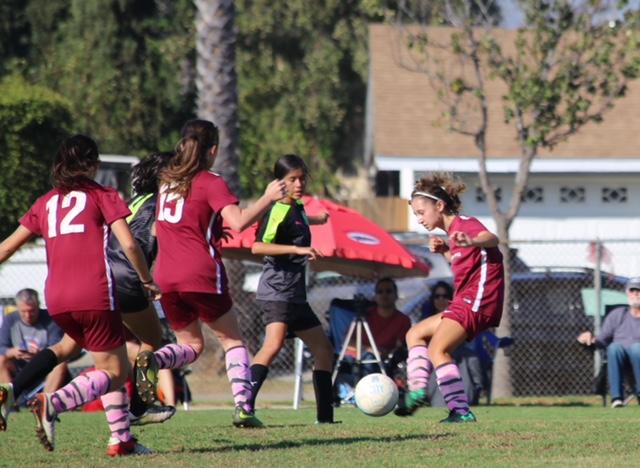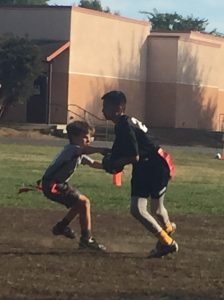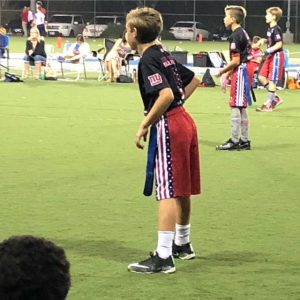Deciding when to have a child specialize- playing just one sport or joining a higher level travel team- is a challenge faced by many families.
It might mean stopping or limiting other sports or activities.
There’s definitely a time and financial commitment.
Not to mention the worry about a child missing out on opportunities that may influence ability to play in high school or even past high school.
As a parent of 3 school-age kids, I definitely acknowledge the pressures placed on families and children to specialize at young ages.
As a sports physician trying to give guidance, I am pleased to refer to the clinical report Sports Specialization and Intensive Training in Young Athletes written by trusted friends and colleagues on the American Academy of Pediatrics (AAP) Council on Sports Medicine and Fitness.
I share this not only because it uses a question/practical answer format that I enjoy (see my Children and Sports Guide for example) but also for the use of solid evidence to address those common questions about when and if to specialize.
Does Sports Specialization Lead to a Successful Performance and Career?
Most authorities agree that sports specialization, in general, leads to higher athletic “success,” but the optimal timing of specialization is only now becoming clearer. Studies have shown that Division 1 NCAA athletes are more likely to have played multiple sports in high school and that their first organized sport was different from their current one. Many examples exist of professional athletes who have learned skills that cross over to their sport by playing a variety of sports into high school and even college. There were 322 athletes invited to the 2015 National Football League Scouting Combine, 87% of whom played multiple sports in high school and 13% of whom only played football. Other studies in elite athletes have shown that intense training did not start until late adolescence and that these athletes played other sports before specializing. Reviews of studies of elite athlete specialization history revealed that, for the majority of sports, late specialization with early diversification is most likely to lead to elite status. In addition, athletes who engaged in sport-specific training at a young age had shorter athletic careers.
Are 10,000 Hours Needed to Succeed in Sports?
It has often been misquoted that to succeed, an athlete needs to have 10 000 hours of practice/competition over 10 years. The media have incorrectly extrapolated studies of chess players to a formula for sports success. Many examples exist of successful athletes who have <10 000 hours and others who have not succeeded despite having >10 000 hours of practice/competition. Other factors come into play besides sports exposure time. These may include physiologic construction (ie, a high jumper with elastic Achilles tendon) and genetics. For some athletes, elite status may be achieved with 10 000 hours of total deliberate play (child determines activity) and deliberate practice time (adult determines activity) in all sports combined but only 3000 hours of sport-specific training. Evidence is lacking that specialization before puberty is necessary to achieve elite status, and in fact, specialization before puberty is more likely to be detrimental.
When Is It Appropriate and Safe to Specialize?
Current evidence suggests that delaying sport specialization for the majority of sports until after puberty (late adolescence, ∼15 or 16 years of age) will minimize the risks and lead to a higher likelihood of athletic success.Only 0.3% of German athletes in Olympic sports selected at the youngest level were ranked internationally, and most elite athletes specialized in their primary sport later in life. Specialization can be divided into early versus late, with the inclusion of early diversification of multiple sports for those who specialize later. Early diversification allows the athlete to explore a variety of sports while growing physically, cognitively, and socially in a positive environment and developing intrinsic motivation. Young athletes can learn many important fundamental physical movement skills with early diversification that can then transfer over to their primary sport if they decide to specialize later. By learning these skills during their developing years through deliberate play (child directed activities), athletes will require less deliberate practice (adult directed activities) to acquire expertise in their chosen sport. Studies have also shown that deliberate play is crucial to normal development and attainment of elite status.Athletes in late adolescence have the cognitive, physical, social, emotional, and motor skills needed to invest into highly specialized training. They can understand the benefits and costs of intense focus on 1 sport and, just as importantly, are able to make an independent decision about investing in 1 sport.
What Are the Risks in Specializing Too Soon or at All?
Young athletes who specialize too soon are at risk of physical, emotional, and social problems. Specializing early with intense training can lead to overuse injuries, which can cause pain and temporary loss of playing time or may lead to early retirement from the sport. The risk of injury is multifactorial, including training volume, competitive level, and pubertal maturation stage. One study in high school athletes showed an increased risk of injury when the training volume exceeded 16 hours per week.. Another study determined that sports specialization was an independent risk factor for injury and that athletes who participated in organized sports compared with free play time in a ratio of >2:1 had an increased risk of an overuse injury. This same study found that young athletes who participated in more hours of organized sports per week than their age in years also had an increased risk of an overuse injury. Burnout, anxiety, depression, and attrition are increased in early specializers. Social isolation from peers who do not participate in the athlete’s sport and lack of being exposed to a variety of sports also are concerns. Restriction in exposure to a variety of sports can lead to the young athlete not experiencing a sport that he or she may truly enjoy, excel at playing, or want to participate in throughout his or her adult life. An additional concern is the risk of physical, emotional, and sexual abuse by the adults involved in the young athletes’ lives as a result of overdependence. Dietary and chemical manipulation are also possible. The combination of these adverse outcomes could lead to a decrease in lifelong physical activity.
Which Sports Require Early Specialization and Are Those Athletes at High Risk?
Figure skating, gymnastics, rhythmic gymnastics, and diving may require early specialization, because peak performance occurs before full physical maturation.However, it is not known whether the training required for such sports poses a risk for athletes’ long-term health and well-being. Studies in gymnasts and figure skaters found that their training did not affect pubertal growth and maturation or adult height. First menstrual period occurred later but within a normal range. However, other studies have shown that female athletes who participate in sports requiring early sports specialization are at higher risk of overuse injuries as well as bone stress injuries, disordered eating and menstrual irregularities.
How Much Training Is Adequate to Succeed Versus Too Much?
The exact amount of training needed to succeed has not been described. The threshold to avoid injuries, burnout, and attrition has not been identified The possible rule of participating in fewer hours of organized sports per week than their age in years or restricting training to <16 hours per week to decrease the chance of injuries needs to be validated by other long-term studies.
Do Sports-Enhancement Programs Lead to Success?
Young athletes need to learn motor development skills, social skills, and psychological skills to succeed. No studies on sports-enhancement programs in youth that only teach sport technique or “conditioning” have shown a greater chance of success despite their increased time and financial investment.
What Are the Effects of Early College Recruitment?
Talented youth are starting to be ranked nationally as early as sixth grade. As colleges start to look at middle school and early high school athletes, more pressure is created for the athlete and parent to do everything possible to succeed. This situation may push athletes into playing year-round and possibly on multiple teams simultaneously to get more exposure and specializing in a single sport sooner for fear of missing their opportunity to impress a college coach. Given what is currently known about early sport specialization, this changing paradigm should be discouraged by society. The AAP, NCAA, pediatricians, parents, and other stakeholders should advocate banning national ranking of athletes and college recruitment before the athletes’ later high school years.




